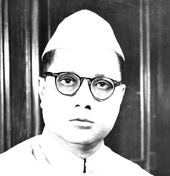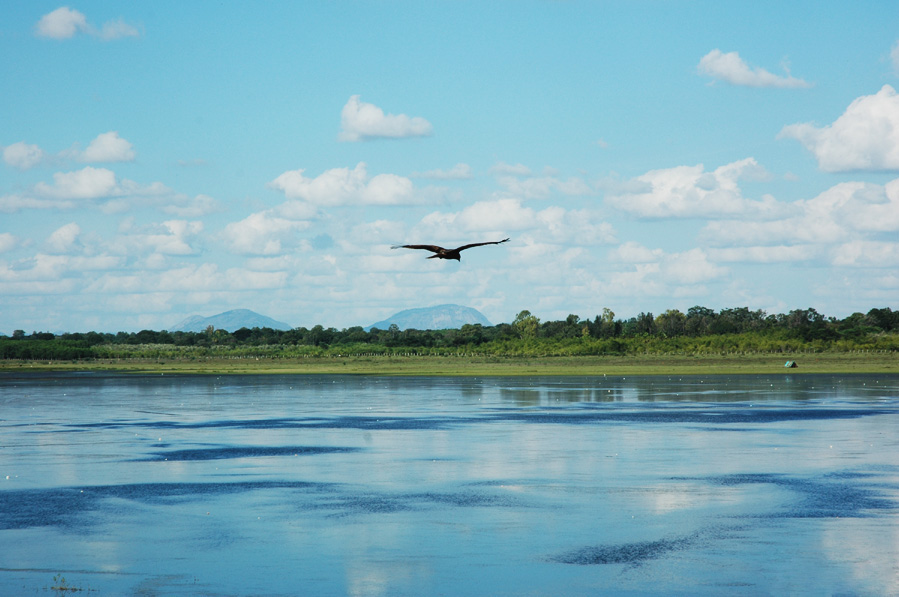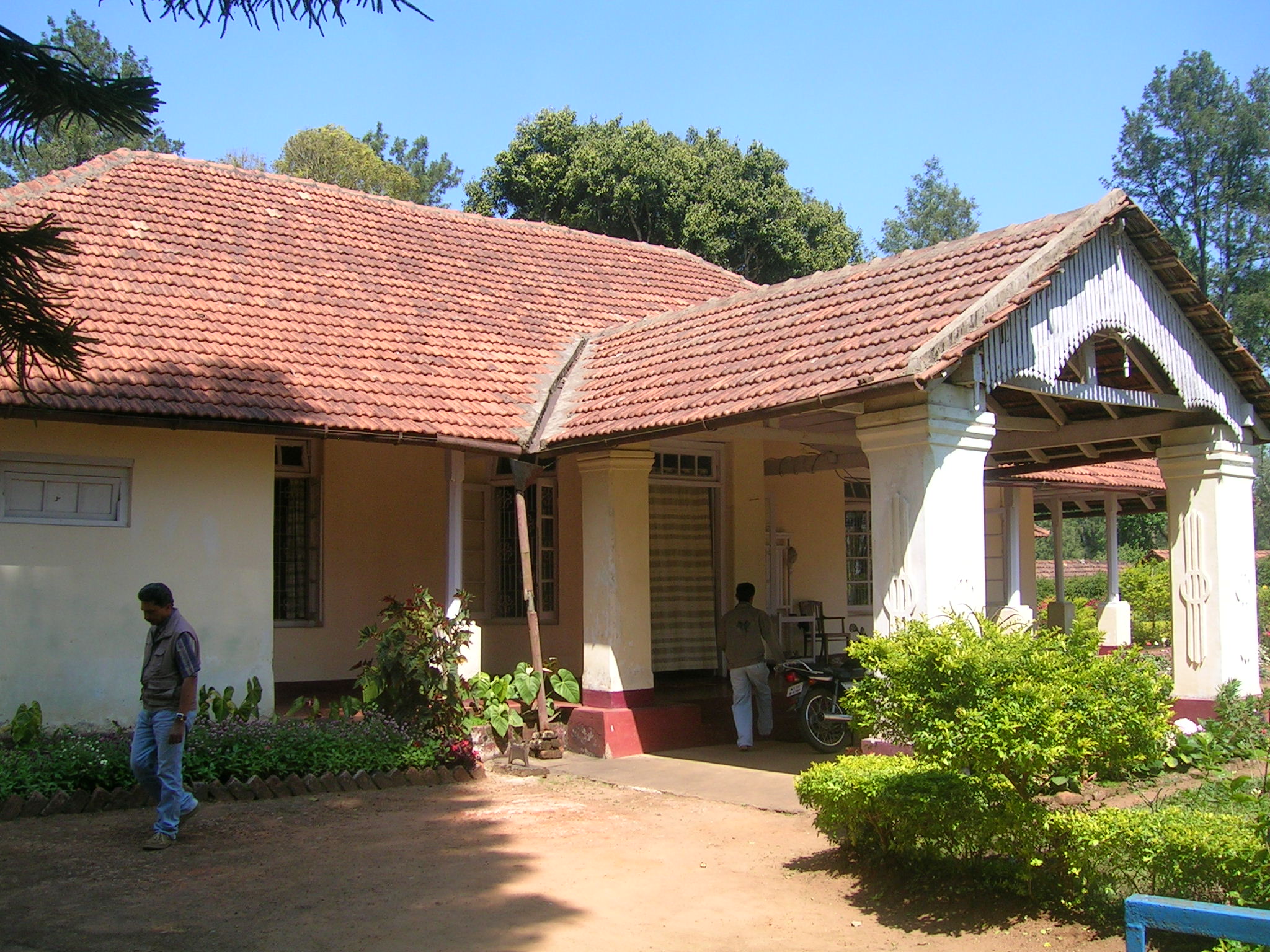|
Gundu Rao
R. Gundu Rao (27 September 1937 – 22 August 1993) was the Chief Minister of Karnataka state from 1980 to 1983. Early life Rao was born in a Kannada Brahmin family in Kushalanagara in the erstwhile Coorg Province (now in Kodagu district of Karnataka) of British India on 8 April 1937. His parents were K. Rama Rao and Chinnamma. His father was a Headmaster in a local school. He studied in Ammathi High school. He was a well-known Ball Badminton Player in Kodagu and had won numerous trophies. Political career Rao began his political career as Town Municipality President of Kushalanagar, a position in which he served for ten years. Later, he was elected as MLA from Somwarpet in 1972 and 1978. He served as minister in the government of D. Devaraj Urs and also as a Leader of Opposition for a brief period. He became Chief minister of Karnataka after the collapse of the Urs government. As Chief Minister, Gundu Rao was responsible for the construction of the Majestic bus station in Ban ... [...More Info...] [...Related Items...] OR: [Wikipedia] [Google] [Baidu] |
List Of Chief Ministers Of Karnataka
The chief minister of Karnataka, formerly known as the chief minister of Mysore, is the chief executive officer of the government of the Indian state of Karnataka. As per the Constitution of India, the governor of Karnataka is the state's ''de jure'' head, but ''de facto'' executive authority rests with the chief minister, a template applicable to all other Indian states. Following elections to the Karnataka Legislative Assembly, the governor usually invites the political party (or a coalition of political parties) with a majority of assembly seats to form the government in the state. The governor appoints the chief minister, whose council of ministers is collectively responsible to the assembly. Given that he has the confidence of the assembly, the chief minister's term is for five years, renewable, and is subject to no term limits.Durga Das Basu. ''Introduction to the Constitution of India''. 1960. 20th Edition, 2011 Reprint. pp. 241, 245. LexisNexis Butterworths Wadhwa Nagpur. ... [...More Info...] [...Related Items...] OR: [Wikipedia] [Google] [Baidu] |
England
England is a country that is part of the United Kingdom. It shares land borders with Wales to its west and Scotland to its north. The Irish Sea lies northwest and the Celtic Sea to the southwest. It is separated from continental Europe by the North Sea to the east and the English Channel to the south. The country covers five-eighths of the island of Great Britain, which lies in the North Atlantic, and includes over 100 smaller islands, such as the Isles of Scilly and the Isle of Wight. The area now called England was first inhabited by modern humans during the Upper Paleolithic period, but takes its name from the Angles, a Germanic tribe deriving its name from the Anglia peninsula, who settled during the 5th and 6th centuries. England became a unified state in the 10th century and has had a significant cultural and legal impact on the wider world since the Age of Discovery, which began during the 15th century. The English language, the Anglican Church, and Engli ... [...More Info...] [...Related Items...] OR: [Wikipedia] [Google] [Baidu] |
The Hindu
''The Hindu'' is an Indian English-language daily newspaper owned by The Hindu Group, headquartered in Chennai, Tamil Nadu. It began as a weekly in 1878 and became a daily in 1889. It is one of the Indian newspapers of record and the second most circulated English-language newspaper in India, after '' The Times of India''. , ''The Hindu'' is published from 21 locations across 11 states of India. ''The Hindu'' has been a family-owned newspaper since 1905, when it was purchased by S. Kasturi Ranga Iyengar from the original founders. It is now jointly owned by Iyengar's descendants, referred to as the "Kasturi family", who serve as the directors of the holding company. The current chairperson of the group is Malini Parthasarathy, a great-granddaughter of Iyengar. Except for a period of about two years, when S. Varadarajan held the editorship of the newspaper, the editorial positions of the paper were always held by members of the family or held under their direction. Histo ... [...More Info...] [...Related Items...] OR: [Wikipedia] [Google] [Baidu] |
Navalgund
Navalgund or Navalagunda is a panchayat town in Dharwad district in the Indian state of Karnataka. Navalagunda or Navilagunda means hill of peacocks. Navalgund is famous for Navalagunda durries. Navalagunda durries has been accorded Geographical Indication (GI) tag. Its GI tag number is 51. Geography Navalgund is located at . It has an average elevation of 578 metres (1896 feet). It is situated 35 km from Hubli and is famous as the birth place of 'Jamkhanas', the floor covering woven using cotton ropes, a kind of flat & thin carpet. It is famous for the Holi festival. The world famous Ramling Kamanna and the famous Naglinga Swamy temple are in Navalgund, as well as the famous Nilamma Tank Annigeri, Alagavadi, Morab and Shalavadi are the main villages. Bennihalla is the main stream that flows through Navalgund. A holy place near Navalagund is Yemanur. Education *Shri Shankar Arts, Commerce & Science College * Shri Gurashantheshwar High School & P U College, S ... [...More Info...] [...Related Items...] OR: [Wikipedia] [Google] [Baidu] |
Nargund
Naragunda is a town in Gadag district in the Indian States and territories of India, state of Karnataka. Geography Nargund is located at . It has an average elevation of 605 metres (1984 feet). Etymology The name "Nargund" comes from "Nari Gundu", which means "Hillock of Foxes" in Kannada. The town is marked by such a hillock right in the centre of town. Although known to be a place full of foxes in the past, it has none now and is pocked with windmills on all sides. Nargund Fort Nargund Fort is located on a hill in the center of town. It was created by the Maratha King Chhatrapati Shivaji in 1674. The fort was planned to be challenging for any enemy to capture it. It was established in order to delay annexation by the Mughals of the territory, acting as a stronghold over the area. Unlike other forts in Karnataka, Nargund Fort had no fortresses or multiple floors (storeys). There was no garden or sanctuary inside. Aside from a few ornamental components, the architect ... [...More Info...] [...Related Items...] OR: [Wikipedia] [Google] [Baidu] |
Kannada
Kannada (; ಕನ್ನಡ, ), originally romanised Canarese, is a Dravidian language spoken predominantly by the people of Karnataka in southwestern India, with minorities in all neighbouring states. It has around 47 million native speakers, and was additionally a second or third language for around 13 million non-native speakers in Karnataka. Kannada was the court language of some of the most powerful dynasties of south and central India, namely the Kadambas, Chalukyas, Rashtrakutas, Yadava Dynasty or Seunas, Western Ganga dynasty, Wodeyars of Mysore, Nayakas of Keladi Hoysalas and the Vijayanagara empire. The official and administrative language of the state of Karnataka, it also has scheduled status in India and has been included among the country's designated classical languages.Kuiper (2011), p. 74R Zydenbos in Cushman S, Cavanagh C, Ramazani J, Rouzer P, ''The Princeton Encyclopedia of Poetry and Poetics: Fourth Edition'', p. 767, Princeton Unive ... [...More Info...] [...Related Items...] OR: [Wikipedia] [Google] [Baidu] |
Gokak Agitation
The Gokak agitation ( kn, ಗೋಕಾಕ್ ಚಳುವಳಿ) was a successful language rights agitation in the 1980s that fought for the first-language status of the Kannada language in the South Indian state of Karnataka. It was named after the committee headed by Vinayaka Krishna Gokak, which recommended giving primacy to Kannada in state schools. Three language formula and opposition Karnataka had adopted the three language formula for education in schools since the linguistic reorganization of states in 1956. Strong opposition to Hindi was witnessed in the 1960s and '70s, leading to Kannada speakers leaning towards English. This created a wide incompatibility between languages used for state administration and education in Karnataka. Sanskrit was the first language at the time in Karnataka high schools, making the state language, Kannada, the third choice, with no requirement that students learn the language spoken by the majority population in high school. Matters c ... [...More Info...] [...Related Items...] OR: [Wikipedia] [Google] [Baidu] |
Kempegowda Bus Station
Nadaprabhu Kempegowda Bus Station (Kan: ನಾಡಪ್ರಭು ಕೆಂಪೆಗೌಡ ವಾಹನ ನಿಲ್ದಾಣ) , also known as Majestic Bus Station, is a main bus station in Bengaluru, India. It is located opposite the KSR Bengaluru. It is bordered by Seshadri Road to the north, Danavanthri Road to the east, Tank Bund Road to the south and Gubbi Thotadappa Road to the west. This bus station provides connectivity to almost all the areas of Bengaluru. One side of the bus station is used for intra-city buses by the Bengaluru Metropolitan Transport Corporation (BMTC) while the other side is used by out-station buses operated by various state road transport corporations. The KSRTC side of the bus station also houses the Nadaprabhu Kempegowda (Majestic) metro station on the Namma Metro. Former chief minister of Karnataka R. Gundu Rao is credited with building the station. The bus station not only eased congestion with buses and helped streamline the transport syste ... [...More Info...] [...Related Items...] OR: [Wikipedia] [Google] [Baidu] |
Bangalore
Bangalore (), officially Bengaluru (), is the capital and largest city of the Indian state of Karnataka. It has a population of more than and a metropolitan population of around , making it the third most populous city and fifth most populous urban agglomeration in India, as well as the largest city in South India, and the 27th largest city in the world. Located on the Deccan Plateau, at a height of over above sea level, Bangalore has a pleasant climate throughout the year, with its parks and green spaces earning it the reputation as the "Garden City" of India. Its elevation is the highest among the major cities of India. An aerospace, heavy engineering and electronics hub since the 1960s, Bangalore is widely regarded as the "Silicon Valley of India" because of its role as the nation's leading information technology (IT) exporter.——— In the Ease of Living Index 2020 (published by the Ministry of Housing and Urban Affairs), it was ranked the most livable Indian ... [...More Info...] [...Related Items...] OR: [Wikipedia] [Google] [Baidu] |
Kodagu District
Kodagu (also known by its former name Coorg) is an administrative district in the Karnataka state of India. Before 1956, it was an administratively separate Coorg State, at which point it was merged into an enlarged Mysore State. It occupies an area of in the Western Ghats of southwestern Karnataka. In 2001 its population was 548,561, 13.74% of which resided in the district's urban centre, making it the least populous of the 31 districts in Karnataka. The nearest railway stations are Mysore Junction, located around away, Thalassery, and Kannur, the latter two located in Kerala at a distance of about . The nearest airports are Kannur International Airport in Kerala ( from Madikeri) and Mangalore International Airport ( from Madikeri). Geography Kodagu is located on the eastern slopes of the Western Ghats. It has a geographical area of . The district is bordered by Dakshina Kannada district to the northwest, Hassan district to the north, Mysore district to the east, Kasa ... [...More Info...] [...Related Items...] OR: [Wikipedia] [Google] [Baidu] |
Kushalanagara
Kushalanagara or Kushalnagar is a city located in the Kodagu district of the Indian state of Karnataka. Surrounded by Kaveri river, it is the gateway to Kodagu district. It also serves as the headquarters of Kushalanagar Taluk. By population, Kushalanagar is the second largest town in Kodagu district after Madikeri and the fastest developing town in the district. Kushalnagar is an important commercial centre in Kodagu. Etymology According to popular myth, the name was given by Hyder Ali who was camped there when he received news of the birth of his son Tipu and called it as ''Kushyal nagar'' (="town of gladness") But in reality, Tipu was born around 1750 while Hyder Ali entered Kodagu for the first time in the 1760s. After the British conquest of Coorg it was known as Fraserpet after Colonel James Stuart Fraser who was the Political Agent in Coorg around 1834. Geography Kushalanagar is located at . It has an average elevation of 844 metres (2726 feet). Kushala ... [...More Info...] [...Related Items...] OR: [Wikipedia] [Google] [Baidu] |
Kannada Brahmin
Kannada Brahmins are Kannada-speaking Brahmins, primarily living in Karnataka, although a few of them have settled in other states like, Telangana, Andhra Pradesh, Kerala and Tamil Nadu. They belong to one of the three main sects: Smartism, Sadh Vaishnavism (Madhva Sampradaya), and Sri Vaishnavism and are followers of Shankaracharya, Madhwacharya and Ramanujacharya respectively. Madhva Brahmins are also called Sadh Vaishnavas and Madhwas. Sri Vaishnava Brahmins are also called Iyengars and Ramanujas. Classification Kannada Brahmins fall under the Pancha Dravida Brahmin classification of the Brahmin community in India. Brahmins generally are further sub-divided into a number of Gotras and the Veda Shakha which professes to follow in the performance of the yagna and rites. In Karnataka, there are as many Rig Vedis as there are Yajur and Sama Vedis together. There are none apparently who acknowledge adhesion to the Atharva Veda. They are also further divided into those who follow t ... [...More Info...] [...Related Items...] OR: [Wikipedia] [Google] [Baidu] |





